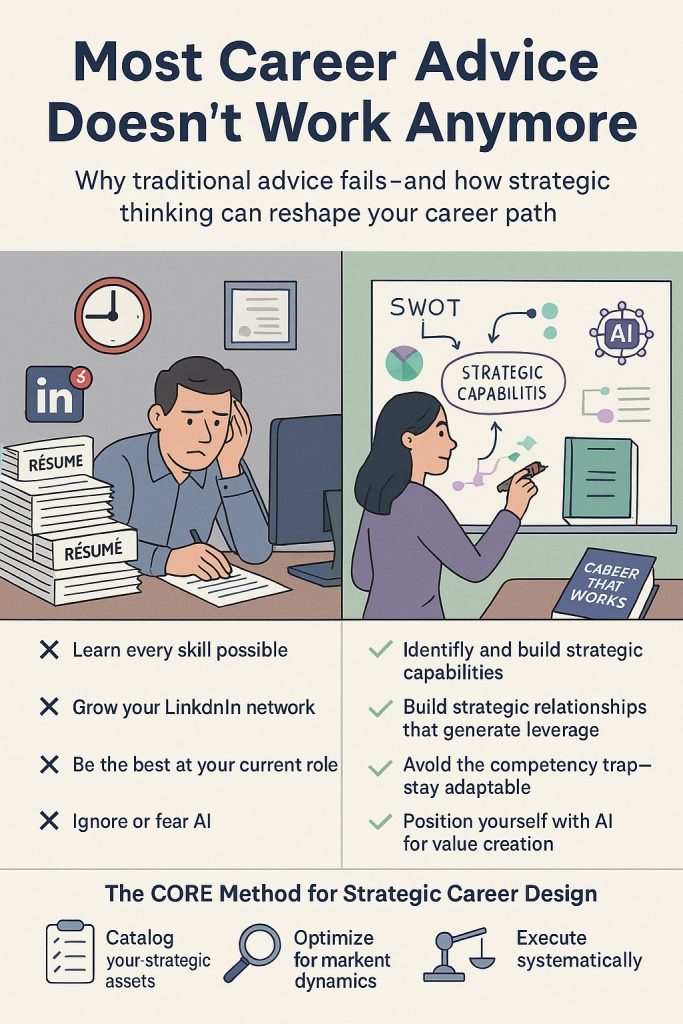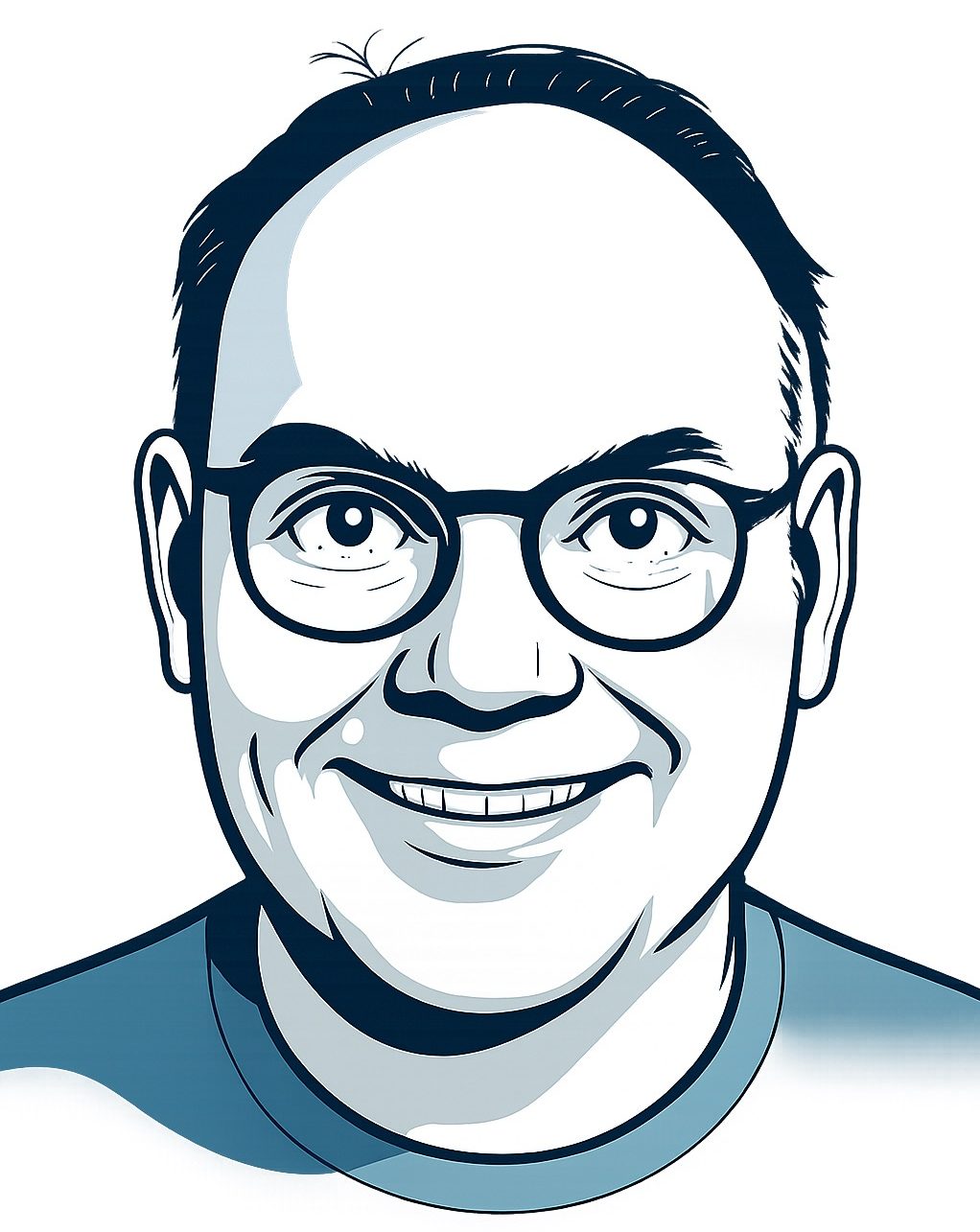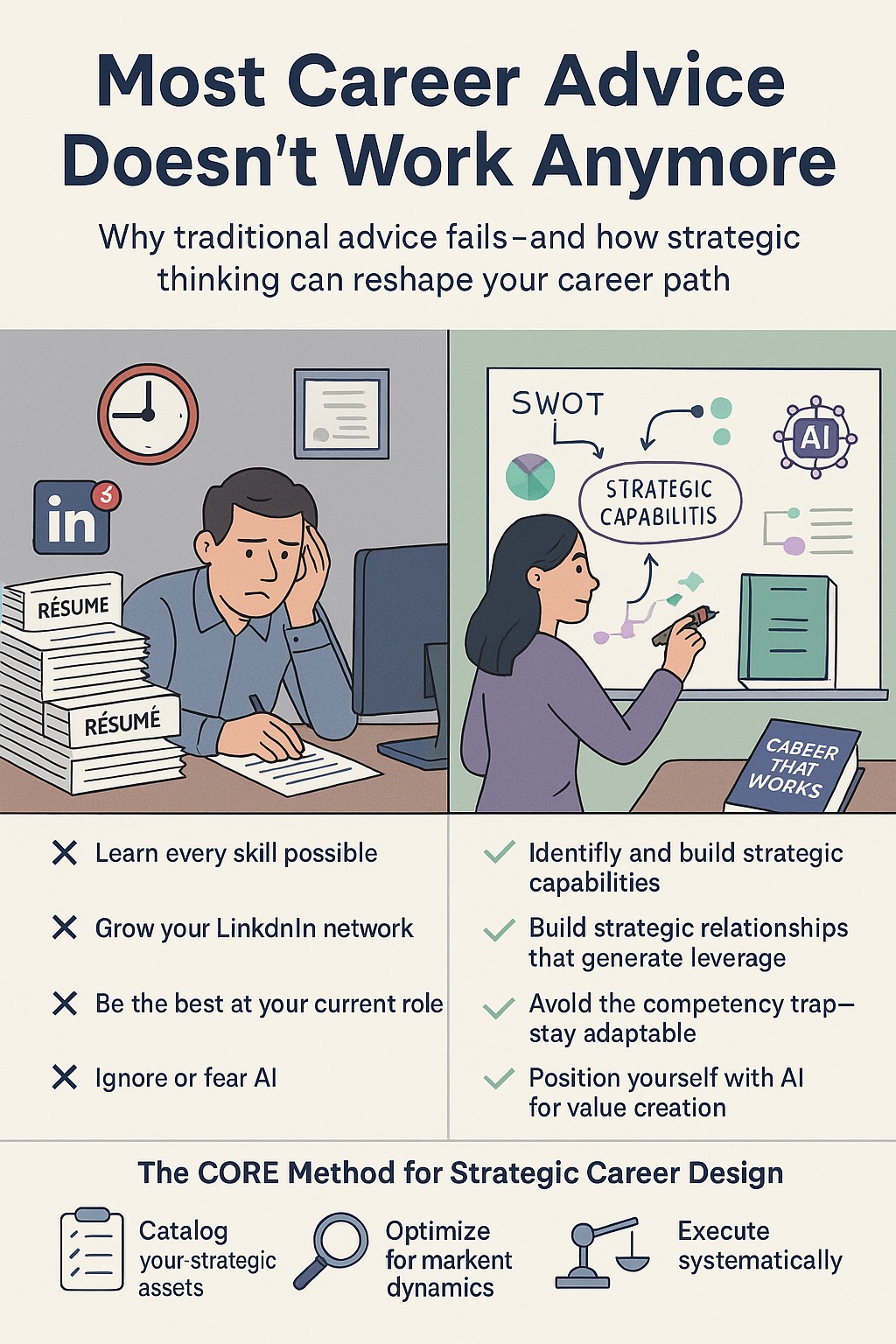In 2013, I was stuck in a sales job that felt like a dead end. Good at hitting targets, but I could see exactly how far that would take me—and it wasn’t far enough. Every application for better roles came back with the same response: “We need someone with a university degree and specialized B2B experience.” I had neither, plus my English wasn’t strong enough to compete in an increasingly global market.
I’ve been thinking a lot about that period lately, especially as I watch so many smart, hardworking people—including myself at times—feel stuck in their careers despite following all the conventional wisdom. Build skills, network, and work hard. It’s not working for most of us anymore.
After spending the last decade in business strategy and recently publishing the book Strategic Capabilities, I started wondering if there might be better approaches. Not revolutionary ones, just… different. More realistic about how careers actually work in 2025.
What I Did (And What I’m Still Learning From It)
Back in 2013, instead of accepting my limitations or hoping for luck, I did something that felt risky at the time. I took Jim Rohn’s advice and started working on my skills twice as hard. I enrolled in a US-based Business Administration program—not just for the degree, but to build English proficiency simultaneously. I signed up for advanced sales courses. And here’s the part that made everyone think I’d lost my mind: I took a job on a car factory assembly line.
A step backward financially, sure. But it funded my two-year capability development plan while keeping me focused on the long-term goal. Every choice was calculated to bridge the gap between where I was and where I wanted to be.
It worked, but not in the way I expected. The real lesson wasn’t about working harder—it was about thinking strategically. I’d accidentally applied business strategy principles to my own career development, and the results were dramatically different from just “trying harder.”
That experience shapes how I think about career development now. Not because I have all the answers, but because I learned that most career advice ignores how strategic thinking actually works.
The Problems I Keep Seeing (And Have Experienced Myself)
The Skills Race Nobody Can Win
I have friends who spend their evenings learning new software, earning certifications, attending webinars. They’re exhausted but can’t stop because they can feel their technical skills becoming outdated faster than ever. I did this too for years—that frantic feeling that you’re falling behind if you’re not constantly learning something new.
The math just doesn’t work. You can’t accumulate skills faster than the market makes them irrelevant. What used to stay relevant for years now feels obsolete in months.
From my work in business strategy, I know successful companies don’t try to build every capability—they focus on strategic positioning that makes specific capabilities less critical. Maybe we need the same approach for our careers.
Networks That Don’t Actually Help
LinkedIn tells us we need bigger networks, but I know plenty of people with impressive connection counts who still struggle to find opportunities. I’m guilty of this too. I confused having lots of professional contacts with having relationships that could actually provide market insights, introductions, or opportunities when I needed them.
In my strategic capabilities research, I’ve seen how companies build strategic partnerships versus just vendor relationships. The difference is everything. Strategic partnerships create competitive advantage, not just social connection. We need to think about our professional relationships the same way.
Getting Trapped by Your Own Success
This one hits close to home. The better you get at your current role, the more people see you as “the [whatever] person.” Which is great until the market shifts and you want to move in a different direction.
I’ve watched colleagues become so specialized and valuable in their current positions that they couldn’t transition when they needed to. Their expertise became limiting rather than enabling. In business strategy, we call this the “competency trap”—when existing capabilities prevent you from developing new ones.
The most successful companies regularly cannibalize their own products to stay ahead of market evolution. Maybe we need to think about our careers the same way.

The AI Question Nobody Wants to Face
Most of us are still figuring out what AI means for our work. The temptation is either to panic or pretend it’s not happening. Neither feels particularly useful.
What I’m seeing from companies that navigate technological disruption well is that they don’t try to compete with the new technology—they find ways to work with it that create new value. They position themselves in the 20% of roles that become more valuable because of the technology, not the 80% that get commoditized.
This is probably the approach we need for individual careers too.
A Different Way of Thinking About It
I’ve been experimenting with systematically applying business strategy concepts to career development. Not because I think I have all the answers, but because traditional career advice feels increasingly disconnected from reality, and I have a decade of experience seeing how strategic thinking actually works in business contexts.
Here’s what I’m trying, based on frameworks I’ve used with companies:
Taking Strategic Inventory
Instead of just updating my résumé, I’m analyzing my complete portfolio of assets using Resource-Based View principles—skills, experience, relationships, credibility, even motivations. What actually gives me sustainable competitive advantage versus what’s just… there?
Understanding Market Dynamics
This means applying real market analysis to career positioning. Where are opportunities genuinely growing? What competitive dynamics affect my positioning? How is market evolution creating new categories of valuable work? It’s uncomfortable but necessary.
Finding Strategic Leverage
Instead of trying to improve everything, I’m looking for the few changes that might create disproportionate results—what Porter would call “strategic positioning.” What small moves could significantly improve my competitive advantage?
Building Strategic Capabilities
Rather than random skill-building, I’m being intentional about developing capabilities that reinforce each other and create multiplicative rather than additive value. Making sure my efforts actually compound.
Why This Might Actually Work
The reason I think this approach has potential is that it’s based on frameworks I’ve seen create billions in market value. These aren’t career theories—they’re proven strategic thinking tools adapted for individual application.
It also acknowledges that AI is changing the game, but instead of fighting that change, it looks for ways to position ourselves advantageously within the new reality.
Most importantly, it’s designed for market evolution. Instead of betting on specific skills or industries, it builds strategic thinking capabilities that remain valuable regardless of how markets change.
What I’m Still Learning
I’m working on turning these ideas into something more systematic—a book called “Career That Works” that explores what strategic career development might actually look like. It’s based on my strategic capabilities research, but adapted for individuals rather than corporations.
The core idea is simple: if strategic thinking frameworks work for businesses, they should work for individuals too. We just need to translate them from corporate to personal contexts.
I’m calling it the CORE method—Catalog your strategic assets, Optimize based on market reality, Reach for strategic leverage points, Execute systematically. Not because I have it all figured out, but because I think we need better frameworks for navigating careers in an uncertain world.
The Reality Check
Here’s what I know from both my own experience and my work in business strategy: the old career playbook isn’t working for most people anymore. The rules have changed, but the advice hasn’t caught up.
The professionals who figure out strategic approaches to career development—who learn to think about positioning and competitive advantage rather than just working harder—will probably do better in an AI-shaped world.
Those who don’t might find themselves competing for opportunities that are shrinking rather than growing.
It’s not about being smarter or working harder. It’s about being more strategic with the time and energy we’re already investing.
Where This Goes
I don’t think there’s one right answer to career development in 2025. But I do think we need approaches that acknowledge current realities rather than pretending it’s still 2015.
Strategic thinking isn’t a magic solution, but it might be a more realistic one. At minimum, it’s helping me make better decisions about where to focus my limited time and energy, and the frameworks I’ve developed are helping others do the same.
If you’re feeling stuck or frustrated with traditional career advice, maybe it’s worth trying a different approach. Not because it’s guaranteed to work, but because what we’re doing now clearly isn’t working for most people.
The window for adapting to these changes won’t stay open forever. But it’s still open now.
Career That Works: The CORE Method for Strategic Career Design is my attempt to systematize these ideas into something practical. It exists because I think everyone deserves better frameworks for navigating their careers, regardless of where they’re starting from. It’s coming soon…
The strategic capability frameworks that have created competitive advantage for businesses can be systematically applied to individual career development. Your career is your most important business—maybe it’s time to run it strategically.
P.S. I have done something similar with my book called Talk That Works. I applied modern sales and marketing principles in everyday communication. Check it out.

